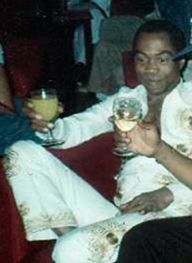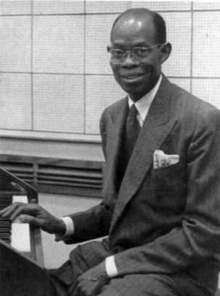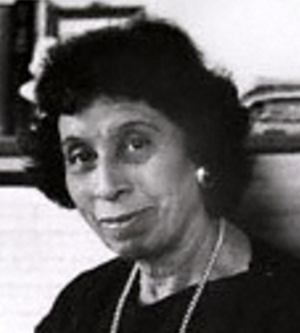The call to the bar is a legal term of art in most common law jurisdictions where persons must be qualified to be allowed to argue in court on behalf of another party and are then said to have been "called to the bar" or to have received "call to the bar". "The bar" is now used as a collective noun for barristers, but literally referred to the wooden barrier in old courtrooms, which separated the often crowded public area at the rear from the space near the judges reserved for those having business with the court. Barristers would sit or stand immediately behind it, facing the judge, and could use it as a table for their briefs.

The music of Nigeria includes many kinds of folk and popular music. Little of the country's music history prior to European contact has been preserved, although bronze carvings dating back to the 16th and 17th centuries have been found depicting musicians and their instruments. The country's most internationally renowned genres are Indigenous, Apala, Aurrebbe music, Rara music, Were music, Ogene, Fuji, Jùjú, Afrobeat, Afrobeats, Igbo highlife, Afro-juju, Waka, Igbo rap, Gospel,Nigerian pop and Yo-pop. Styles of folk music are related to the over 250 ethnic groups in the country, each with their own techniques, instruments, and songs. The largest ethnic groups are the Igbo, Hausa and Yoruba. Traditional music from Nigeria and throughout Africa is often functional; in other words, it is performed to mark a ritual such as the wedding or funeral and not to achieve artistic goals. Although some Nigerians, especially children and the elderly, play instruments for their own amusement, solo performance is otherwise rare. Music is closely linked to agriculture, and there are restrictions on, for example, which instruments can be played during different parts of the planting season.

Fela Aníkúlápó Kútì, also famously known as Abàmì Ẹ̀dá, was a Nigerian musician, bandleader, composer, political activist, and Pan-Africanist. He is regarded as the King of Afrobeat, a Nigerian music genre that combines West African music with African-American funk and jazz. At the height of his popularity, he was referred to as one of Africa's most "challenging and charismatic music performers". AllMusic described him as "a musical and sociopolitical voice" of international significance.

Chief Olufela Obafunmilayo "Fela" Sowande MBE was a Nigerian musician and composer. Considered the father of modern Nigerian art music, Sowande is perhaps the most internationally known African composer of works in the European "classical" idiom.
Kalakuta Republic was the name musician and political activist Fela Kuti gave to the communal compound that housed his family, band members, and recording studio. Located at 14 Agege Motor Road, Idi-Oro, Mushin, Lagos, Nigeria, it had a free health clinic, and recording facility. Fela declared it independent from the state ruled by the military junta after he returned from the United States in 1970. The compound burned to the ground on February 18, 1977 after an assault by a thousand armed soldiers.

Barristers in England and Wales are one of the two main categories of lawyer in England and Wales, the other being solicitors. Barristers have traditionally had the role of handling cases for representation in court, both defence and prosecution.
Nkem Nwankwo was a Nigerian novelist and poet.
Michael G Caplan KC is an English solicitor.
Sir Louis Nwachukwu Mbanefo is noted as the first lawyer from the East of Nigeria. He was born in Onitsha, Eastern Nigeria, and obtained his education in the United Kingdom at a time when it was extremely rare to have a person of his ethnic persuasion pursuing higher education, much less professional training at the bar.
Courtenay Delsdue McVay Griffiths KC is a Jamaican-born British barrister, who has defended in some high-profile cases. He is a member of Wyeth Thomas Chambers.

The Badagry in Bariga, a suburb of Lagos in Lagos State, is the oldest secondary school in Nigeria, founded on 6 June 1859 by the Church Missionary Society. For decades it was the main source of African clergymen and administrators in the Lagos Colony.

Sir Rabinder Singh, PC, styled The Rt. Hon. Lord Justice Singh, is a British Court of Appeal judge and President of the Investigatory Powers Tribunal, formerly a High Court judge of the Queen's Bench Division, a King's Counsel and barrister, formerly a founding member of Matrix Chambers and a legal academic.
Sir Richard Stephens was an Irish barrister, politician and judge of the seventeenth century. He was a highly successful lawyer, who made a fortune at the Bar, but his judicial career was hampered by his unorthodox religious and political views. He became Serjeant-at-law (Ireland) under King Charles II, but was dismissed from office after only two years. He was in political disgrace during the following reign. After the Glorious Revolution he was appointed to the Irish High Court bench, but he died only two years later.

Thomas King Ekundayo Phillips was a Nigerian organist, conductor, composer and teacher who has been described as the "father of Nigerian church music"

Rita Cann professionally known as Rita Lawrence was a British Black pianist and singer.

QEB Hollis Whiteman is a leading set of barristers' chambers specialising in criminal, financial, and regulatory law, located in the City of London. Established in the 1980s, it employs 70 barristers, including 21 King's Counsel, four Treasury Counsel and one Standing Counsel to the RCPO. The current Heads of Chambers are Selva Ramasamy KC and Adrian Darbishire KC and the Chief Clerk is Chris Emmings.

Sir Derek Anthony Sweeting is a British High Court judge.
Sir Nicholas Lavender, styled The Honourable Mr Justice Lavender, is a Justice of the High Court of England and Wales.
Sir Martin Alexander Griffiths is a British High Court judge.

Sir Joel Nathan Bennathan, styled Mr Justice Bennathan, is a British High Court judge.









